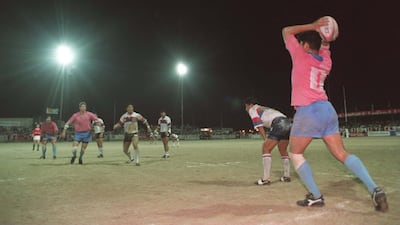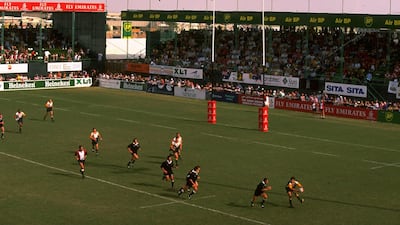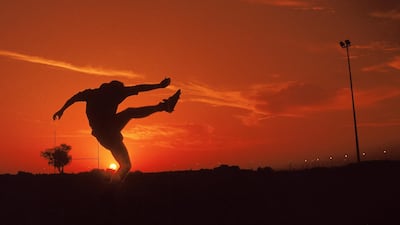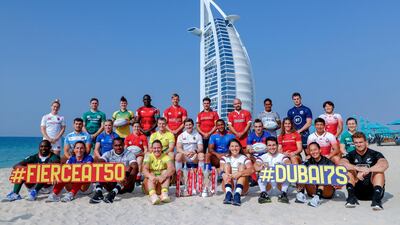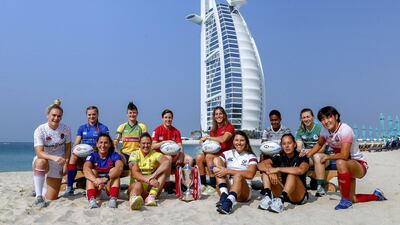Listing all the differences between the 50th Dubai Rugby Sevens and what it was like when it started is a pointless exercise.
Suffice to say, like the city in which it is staged, the tournament has changed beyond all recognition in the past half a century.
If anything exemplifies the point best, maybe it is that a Grammy award-winning superstar will be performing at the venue’s Other Stage this weekend.
Kylie Minogue is expected to begin the performance of her greatest hits from about 9.30pm on Friday night on Pitch Two, once all the rugby is done for the day.
That is the smaller of the two show-fields at a purpose-built rugby venue, 22kms further into the desert than the original site.
The Sevens Stadium grounds, it is fair to say, are the envy of professional clubs the world over, with its eight immaculate grass pitches, swimming pool, vast changing facilities, and a main field that can accommodate 50,000 fans.
It could not be further from the 1970 version, which saw some rugby-loving expatriates who were working in the Gulf in the oil and gas industry, stage a sevens tournament on the sand in Al Awir.
They invited along some members of the British armed forces, who were happy for the break from garrison duties in what was then the Trucial States; the Sevens predates the formation of the UAE by two years.
The Staffordshire Regiment are said to have been the first winners – although that account is actually disputed by some of the soldiers who were stationed here back then.
Supporters, who were likely friends and family of the players – and numbered significantly fewer than the 100,000 or so who will pass through the gates this weekend – either lined the touchline or sat on the back of trucks.
The pitch was sand rolled flat, and marked with bitumen. The Dubai Sevens was only played on grass for the first time in 1995, thanks to significant investment by the sponsors Emirates Airline.
Even after that, most domestic rugby in the region was played on sand. A sand pitch in Ras Al Khaimah was in use for competitive rugby up until two seasons ago.
Although the memories of tournaments played on sand remain vivid and evocative, the advance of modernity is definitely a good thing, according to some.
Anyone who yearns for a return to the days of playing on the sand is kidding themselves, according to Mike Jackson, whose playing career with Dubai Hurricanes often involved home matches on grass, with away games on sand.
“It was like playing in flour with bits of brick in it,” Jackson said. “Then you would get nicks and cuts that would go septic.
“When we played Muscat [the Oman-club played home games on sand until relatively recently], all the Muscat guys would know what they were doing.
“They would go into the changing room, have a decent shower, then put iodine on all their nicks.
"Then we’d go to training on a Monday night, and some guy would have a big lump sticking out of his leg that had gone septic.”

Others remember it more fondly. “It was amazing,” said Mike Friday, who first played in 1994 with an invitational team, returned as an England player, and is back here again 25 years later as coach of United States in the World Series.
“We really did come to the desert to play that year. It was what made it so different.
“It was a shame when they moved from sand to grass, but they have still kept the tradition where you can walk the fields and there are all different levels.
“I remember in those days, I was here playing for England. We were in the changing room getting ready and there was an old boy sat there, with his big belly out, looking across to us in our England shirts and saying: ‘Who have you got, mate?’
“That to me is the spirit of rugby, and the spirit of the Dubai Sevens is that it is a true festival of rugby.
"Everybody comes to the desert to play rugby and have fun. That is the game, and long may that continue.”
Retaining that spirit was a central part of the masterplan for the new venue which was built in 2008, after the old ground in Al Awir was bulldozed to make way for Meydan.
Which is why the main field is still – as it was in its previous guise down the road – lined by scaffolding stands rather than a permanent structure.
“Everyone thinks about Dubai as this young, vibrant city, but there is also a lot of history,” said Gary Chapman, the president of Emirates group services and dnata, the competition’s organisers.
“I think the Sevens is embedded in that history as much as any event, or anything that happens in Dubai.
“There’s the business side to it and that is very much about the World Series, but there is another side to it as well, and I think it is why we love the sport so much.
“There are a large number of charity teams that come to Dubai. They are full of ex-internationals and ex-professional players, and for me that embodies what Dubai is, but also the sport of rugby.”
